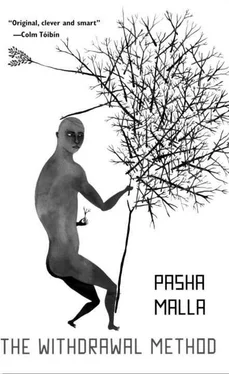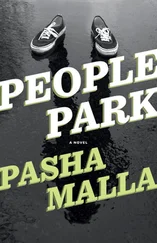"Christ, I never thought we'd get a moment alone."
Schlumberger glanced shyly at Maelzel before his gaze retreated to the floor. "Finally."
A local appeared at their table selling beaded necklaces. He stood there, a shirtless mulatto with a patchy beard, wares in hand, waiting patiently while Maelzel frowned and patted the pockets of his waistcoat. Schlumberger slapped at a mosquito on the nape of his neck. "Please, I'll get it, Johann."
The man pocketed the coins and wreathed Schlumberger. "~Otras cosas?" asked the Cuban, winking at Maelzel, who shook his head, slumped in his chair, and waved the fellow away.
Schlumberger regarded Maelzel across the table and felt a pang of melancholy at what confronted him. Where was the charisma, the life, the energy of the great showman who had entranced crowds across Europe? Since coming to America, Schlumberger had struggled to avoid noticing his companion's steady decline in vivacity, but here it was: eyes sunken, hair dishevelled — the grey, dejected visage of a man beaten and broke. The thirty years that separated them were obvious.
"Don't worry," said Schlumberger, swatting at another mosquito, "you'll get back on top once this exhibition gets going. They loved you when we were here last."
"Oh, it's hardly just me, is it?" sighed Maelzel, pulling his hands sharply away as Schlumberger tried to take them in his. "I'm just who they see, parading around like some circus buffoon. You're the true genius behind our operation."
Schlumberger blushed. "I am only a pawn in the great Maelzel spectacle."
"Bah," said Maelzel, and disappeared behind his drink.
Schlumberger had found that lately he and his companion had taken to repeating conversations, and this one was familiar. He already knew what was coming next.
"You know old Kempelen never intended for a man to be inside, don't you?" Maelzel nodded at his own words, twisting his glass of rum absently round a ring of moisture on the table. "Imagine a machine that could play better than any man, Schlumberger! Imagine if he'd been able to do it. It must have eaten Kempelen alive. He was never able to make peace with himself because of it and died a lonely, sad old man." Maelzel drank, then continued. "And to think, seventy years later, his failure is my biggest success."
Maelzel disappeared once more behind his glass of rum. There were things Schlumberger wanted to say, but they would have to wait until this whole tour was over and he and Maelzel were back on American soil. Then Maelzel would be finally able to pay off his many debts, and they could pack the Turk up and get on with their lives.
Schlumberger lifted the beaded necklace and scratched absently at the swelling mosquito bite on the back of his neck. From across the table, Maelzel stared past him at some indefinite place in the dark, lifted his glass again, and drained it.
AFTER FOUR DAYS of preparation, the exhibition began. On opening night a huge crowd gathered to be dazzled by Maelzel and his automata; many had to be turned away at the door for lack of adequate seating. The show began with the famous trumpet player playing the customary Handel — and, as per the French-born Schlumberger's request, also a rondo of Chopin's that left the crowd somewhat bemused.
Many of the locals and American expatriates in attendance were especially interested in Maelzel's updated Conflagration of Moscow, the original version of which hadn't made the trip on his first visit to Cuba. Maelzel wheeled the complex diorama onstage. "The Conflagration," he announced to a round of cheers, "of Moscow!"
After winding a crank to set the mechanism in motion, the showman retreated backstage with Schlumberger. Squeezing his secretary's knee as he sat down, Maelzel noticed that the young man looked flushed; sweat beaded his temples and along his upper lip. "All right?" asked Maelzel. Schlumberger nodded wanly, his gaze sinking to the floor.
The musical score to The Conflagration, composed by Maelzel's good friend Ludwig van Beethoven, began. Artificial daylight crept over the scene; mechanical peasants emerged from their miniature homes. The music grew in intensity, the movements accelerated, and when the first round of pyrotechnics flared up, the crowd yelped in shock and delight. Buildings toppled and bridges collapsed as Moscow's proud citizenry hurriedly razed the city to spite the invisible, encroaching Napoleonic army.
When the show concluded a few minutes later with a climactic rumble and a puff of smoke, the diorama lying in ruins, Maelzel bounded onstage to a roaring ovation from the audience. Schlumberger smiled weakly as Maelzel grandstanded about, playing to his fans, showing a hint of the old "prince of entertainers" who had taken Europe by storm over the last few decades. Still, there was desperation to it, as though this show could make or break his career — which, Schlumberger knew, was not far from the truth.
A succession of other displays of Maelzel's mechanical wizardry followed. By the time intermission finally came, Schlumberger's state had drastically declined. Backstage, meeting Maelzel to prepare the Turk, he collapsed, panting, drenched in sweat.
Maelzel laid a hand on Schlumberger's shoulder. "Jesus, you're looking rough."
"Thanks," said Schlumberger, struggling to his feet. "I'm sure it's just the heat."
"I've got just the thing." Maelzel produced a half-empty bottle of wine from a secret compartment. "Beaujolais."
Schlumberger watched him drink, but declined the bottle when it was offered him. Dabbing sweat from his brow with his handkerchief, he slumped back against the cabinet, shivering.
"We can cancel the show," Maelzel said, suddenly subdued, his hand on Schlumberger's shoulder, "if you're not feeling up to it."
"No, no. I'm okay. Let's try to get through two games."
Maelzel drained the last of the wine. With a quick look around, he leaned in and planted a kiss on the top of Schlumberger's head. "God, you're burning up."
"I'll be fine." Forcing a smile, he added, "The show must go on.
Schlumberger climbed into the cabinet while Maelzel lit the candles that allowed the Turk's operator to see in the dark. On the chessboard above, Maelzel positioned the pieces in the middle of each square so the magnets would line up with those below. Then he kneeled before the cabinet where Schlumberger sat curled behind his control panel. Gazing into those shadows, Maelzel thought of the show in Baltimore, after which the two of them had made love inside the Turk. It had been a cramped, goofy affair, and when they were finished, realizing they were locked in, they had been forced to kick the doors open from inside.
"And you're clear on how the new speaking contraption works?"
Schlumberger pressed a button. "Check," came a voice from the Turk. He pressed it again. "Checkmate," said the Turk.
Maelzel's smile quickly faded. "You okay?"
"Yes." Schlumberger's voice was faint and hollowsounding.
Maelzel paused, then swung the doors closed, the click of the catches securing them in place. After a quick once-over, he rapped on the Turk's chessboard, waited, and then felt a flood of relief when a muffled knock finally came in reply. Maelzel wheeled the Turk onstage, where he was greeted with a burst of applause from the audience.
Although most in attendance had heard it before, Maelzel went through his usual spiel about "the amazing chess-playing Turk, the machine that has bested the greatest players in Europe," striding back and forth across the stage, all grand gestures and booming voice. The contraption itself was simple enough: seated behind a desk sat a wooden dummy in the flowing robe and sequined turban of an Ottoman emperor. On the desk itself were painted the checkered squares of a chessboard, over which loomed one of the Turk's hands; the other held a spindly, Oriental pipe. The front of the cabinet had two sets of doors. Maelzel strode up to these and flung one side open, revealing what appeared to be an empty cupboard. He waited until Schlumberger had time to shuffle over to the other side, and then did the same with the other doors, where a facade of utterly inoperative cogwheels and gears gave the impression that the Turk was, indeed, a functional machine.
Читать дальше












